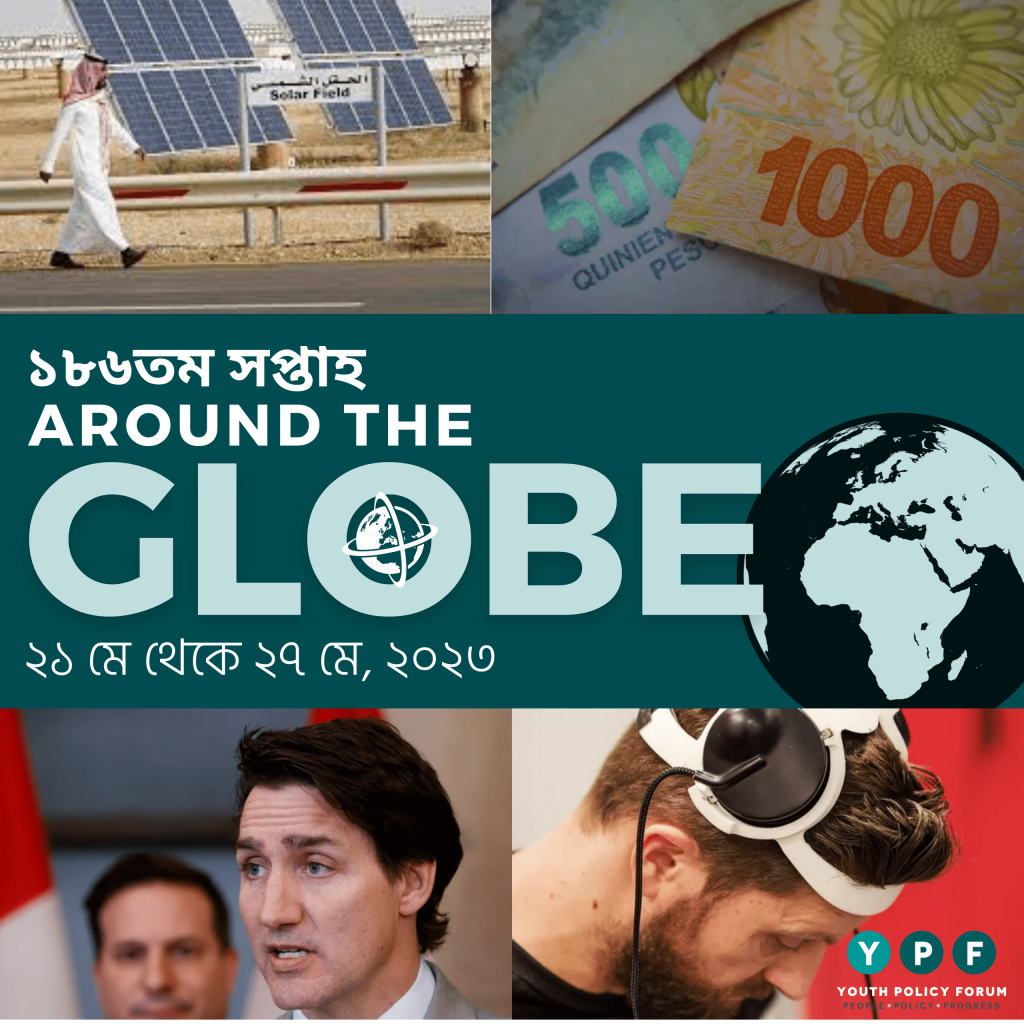Timeframe: May 21 to May 27, 2023
Contributors: Farhan Uddin Ahmed, GM Sifat Iqbal, and Safin Mahmood
To read Bangla, click here.
1. Politics
Rwandan genocide fugitive Fulgence Kayishema arrested in S Africa
Rwandan genocide suspects Fulgence Kayishema has been arrested in South Africa, the United Nations tribunal for war crimes committed in Rwanda said on Thursday.
He was arrested on Wednesday after being on the run since 2001.
Kayishema is alleged to have orchestrated the killing of approximately 2,000 Tutsi at the Nyange Catholic Church during the 1994 genocide in Rwanda, the International Residual Mechanism for Criminal Tribunals (IRMCT) said.
Source: Al-Jazeera
Saudi Arabia and Canada restore diplomatic relations, ending 2018 rift
Saudi Arabia restored diplomatic relations with Canada on Wednesday, the country’s foreign ministry said in a statement, ending a five-year rift over Riyadh’s jailing of activists that damaged trade and relations with both countries.
The decision follows discussions between Saudi Crown Prince Mohammed bin Salman and Canada’s Prime Minister Justin Trudeau last November on the sidelines of the Asia-Pacific Economic Cooperation (APEC) Forum in Bangkok, the statement added.
Canada’s relations with Saudi Arabia nosedived in 2018 after officials in Ottawa accused the kingdom of human rights violations and demanded the release of imprisoned activists. Saudi Arabia responded by freezing new trade and investment deals, suspending flights to Canada, reassigning students studying there and expelling Canada’s ambassador to Saudi Arabia, while recalling its own.
Source: CNN
2. Economics & Business
Highest-denomination bill in Argentina is now the 2,000-peso note, worth $4
Argentina’s new 2,000-peso bill, the country’s largest-denomination note, went into circulation on Monday, though due to fast depreciation of the currency it is worth only $8.50 at the official exchange rate and just over $4 in commonly used parallel markets.
The peso has shed about a quarter of its value against the dollar this year despite strict capital controls that slow its fall. Most Argentinians buy dollars in unofficial markets where they trade at over 480 pesos versus the official rate of 235.
The South American nation is also battling inflation at 109%, one of the highest in the world, which a central bank poll estimates could hit nearly 130% by the end of the year. The interest rate has been hiked to an eye-watering 97%.
Source: The Guardian
3. Science & Technology
Brain implants help paralysed man to walk again
A paralyzed man has been able to walk simply by thinking about it thanks to electronic brain implants, a medical first he says has changed his life. The electronic implants wirelessly transmit 40-year-old paralyzed Gert-Jan Oskam’s thoughts to his legs and feet via a second implant on his spine.
The development, published in the journal Nature, was led by Swiss researchers. Prof Jocelyne Bloch, of Lausanne University, who is the neurosurgeon who carried out the delicate surgery to insert the implants, stressed that the system was still at a basic research stage and was many years away from being available to paralyzed patients.
Harvey Sihota, Chief executive of the UK charity Spinal Research said that although there was a long way to go before the technology would be generally available, he described the development as “very encouraging”.
Source: BBC
4. Environment
Investment in solar energy has surpassed oil
Investment in solar power is expected to surpass oil for the first time this year
While this is a welcome development, the International Energy Agency (IEA) warned on Thursday that investment in fossil fuels will have to fall sharply when it comes to achieving net zero emissions by 2050.
Source: Al-Jazeera
Late Backlash Forces EU Parliament to Postpone Renewable Energy Vote
The European Parliament has postponed the vote on new EU renewable energy targets after facing last-minute opposition from France and other countries. The delay, revealed in a leaked internal email seen by Reuters, pushes the vote to June without a specified date.
This setback hinders the EU’s efforts to solidify its climate agenda, including a binding goal of obtaining 42.5% renewable energy by 2030. France, joined by Bulgaria, Romania, Poland, and others, voiced dissatisfaction with the rules, citing concerns such as the exclusion of low-carbon nuclear energy and overly ambitious targets.
The law’s approval was anticipated to be a mere formality after a supposed final deal earlier this year. Talks are underway to resolve the dispute, but impatience grows among member states as the delay caught them by surprise.
Source: Reuters
Disclaimer: The information provided here is obtained solely from the aforementioned third parties. Youth Policy Forum (YPF) is not responsible for any misinformation or misrepresentation.
